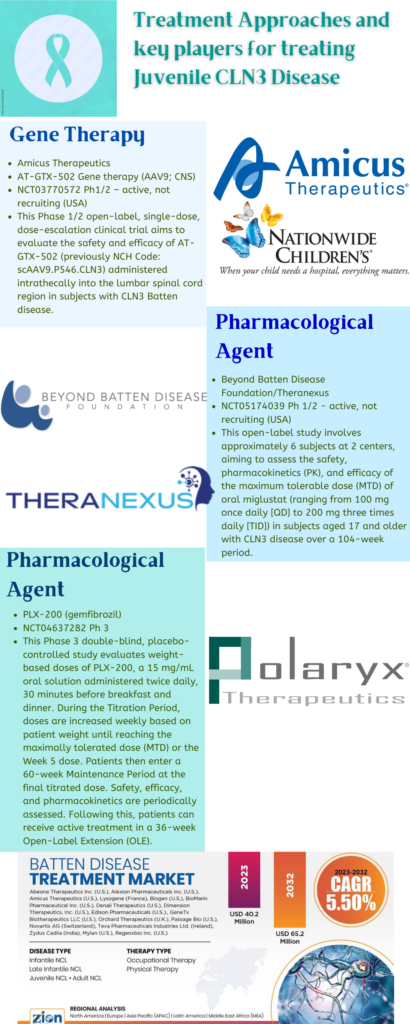Juvenile CLN3 disease, also known as Batten disease, currently has no cure, so specialized symptom management and therapy are crucial for maintaining the quality of life for affected children, young people, and their families. Comprehensive support for parents, siblings, and extended family members is essential.
Therapeutic approaches to Batten disease ranges from –
Enzyme Replacement Therapy (ERT): ERT introduces purified recombinant enzymes intravenously, intraventricularly, or intrathecally to address enzyme deficiency. It has been successfully applied to four Batten disease subtypes (CLN1, CLN2, CLN10, CLN13). Effective treatment requires targeting the CNS by bypassing the blood brain barrier.
Gene Therapy: Adeno-associated virus (AAV)-mediated gene therapy shows potential for treating lysosomal storage disorders and neurodegenerative diseases. For example, intracranial injection of AAV2-hPPT1 increases PPT1 enzymatic activity, alleviating many Batten disease features.
Stem Cell Therapy: Stem cell-based therapy is being studied to address visual deficits in Batten disease. Human CNS-derived stem cells secreting endogenous TPP1 and PTT1 are being tested.
Small-molecule Therapy: Various pharmaceutical and biological agents acting as immunomodulators or neuroprotectants have been tested in Batten disease models over the past decades.
Clinical trial NCT05174039 sponsored by Beyond Batten Disease Foundation (BBDF)along with Theranexus has developed Batten-1. Batten-1 is a new proprietary therapy with miglustat as its active ingredient. Mode of action of Miglustat is by suppressing the production of toxic molecules that accumulate in Batten and other similar disorders, like Gaucher disease. Previously marketed as Zavesca by Actelion for type 1 Gaucher disease, miglustat showed superior efficacy in preclinical studies for Batten disease. Theranexus and the Beyond Batten Disease Foundation (BBDF) have announced final positive data from a Phase I/II trial of Batten-1 for juvenile Batten disease (CLN3). The Phase I/II trial conducted by Theranexus and BBDF evaluated Batten-1 in six patients with juvenile Batten disease (CLN3) aged 17 and over. The patients were treated for 18 months. After the trial, all participants were given the option to continue receiving Batten-1 through a compassionate use program. After 18 months, the drug showed a good safety profile and significantly slowed the progression of motor symptoms in six young adult patients. The mean change in the modified UBDRS Physical Assessment score was +1.83, compared to +6.04 in untreated patients from a natural history study. Based on these results, an Expanded Access Program (EAP) has been initiated for continued treatment of the trial patients. Theranexus is now exploring funding options for a Phase III pivotal trial, which has received positive feedback from the FDA and EMA.

Image: Treatment Approaches and Key Players for Juvenile CLN3 Disease; Image Source: Malini Gupta
The global Batten Disease Treatment Market was valued at approximately USD 40.2 million in 2023 and is projected to grow to around USD 65.2 million by 2032, with an estimated compound annual growth rate (CAGR) of about 5.50% from 2024 to 2032.
Dr. Malini Gupta, Ph.D.
Sources
- https://beyondbatten.org/understanding-batten/prognosis/
- https://pubmed.ncbi.nlm.nih.gov/31568712/
- https://bdsrafoundation.org/research/clinical-studies/
- https://www.zionmarketresearch.com/report/batten-disease-treatment-market
- https://www.theranexus.com/en/platform-and-products/batten-1.html
Disclaimer
The editors take care to share authentic information. In case of any discrepancies please write to newsletter@medness.org
The sponsors do not have any influence on the nature or kind of the news/analysis reported in MedNess. The views and opinions expressed in this article are those of the authors and do not necessarily reflect the official policy or position of MedNess. Examples of analysis performed within this article are only examples. They should not be utilized in real-world analytic products as they are based only on very limited and dated open-source information. Assumptions made within the analysis are not reflective of the position of anyone volunteering or working for MedNess. This blog is strictly for news and information. It does not provide medical advice, diagnosis or treatment nor investment suggestions. This content is not intended to be a substitute for professional medical advice, diagnosis, or treatment. Always seek the advice of your physician or another qualified health provider with any questions you may have regarding a medical condition. Never disregard professional medical advice or delay in seeking it because of something you have read on this website.
MedNess is a part of STEMPeers® which is a 501(c)(3) organization registered in PA as PhD Career Support Group. The organization helps create a growing network of STEM scientists that is involved in peer-to-peer mentoring and support.



